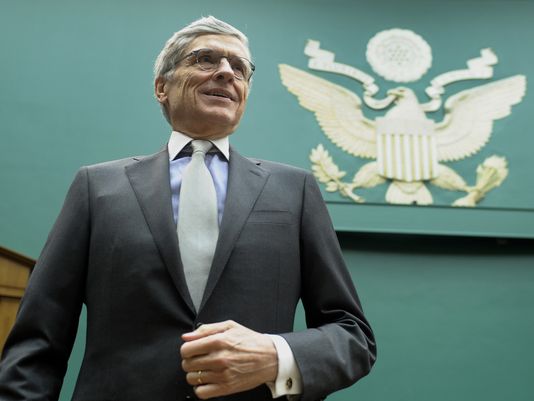FCC chairman revises fast-lane option in net neutrality
HTTP/1.1 200 OK Server: nginx/1.2.7 Content-Type: text/html; charset=utf-8 Content-Language: en Last-Modified: Tue, 13 May 2014 01:22:09 GMT X-UA-Compatible: IE=Edge,chrome=1 X-Secret: cnpudnkgcnpiZXZnbUBoZm5nYnFubC5wYnogbmFxIFYganZ5eSBnZWwgZ2IgdHJnIGxiaCBuIHdiby4= Cache-Control: max-age=20 Expires: Tue, 13 May 2014 01:24:47 GMT Date: Tue, 13 May 2014 01:24:27 GMT Transfer-Encoding: chunked Connection: keep-alive Connection: Transfer-Encoding
Responding to waves of criticism, Federal Communications Commission Chairman Tom Wheeler is revising his net neutrality rule proposals to include a ban on certain types of "fast lanes" for content companies that are willing to pay Internet service providers for the upgrade.
The revision, which seeks comments from the agency's other commissioners, will be circulated today as they get ready to vote Thursday on the proposals.
Wheeler's latest revision doesn't entirely ban Internet fast lanes and will leave room for some deals, including public-interest cases like a health care company sending electrocardiography results.
But unlike his initial proposal last month, Wheeler is seeking to specifically ban certain types of fast lanes, including prioritization given by ISPs to their subsidiaries that make and stream content, according to an FCC official who wasn't authorized talk about the revisions publicly before the vote. The FCC would retain powers to review any prioritization deals that may pose public harm.
Wheeler is also open to applying some "common carrier" rules that regulate telephone companies, which would result in more stringent oversight of the ISPs in commercial transactions.
"It looks like the regulators are trying to address some of the concerns, but the reported changes don't fix the basic problems," said Delara Derakhshani, policy counsel for Consumers Union. "We're still looking at the very real possibility of a 'pay-to-play' market. That's not net neutrality. We still believe the best option for achieving net neutrality and protecting consumers is reclassifying Internet service as a telecommunications service."
On Jan. 15, a federal appeals court threw out the FCC's net neutrality rules — also called Open Internet — removing any legal barriers that would stop Internet service providers from interfering with or discriminating against any data sent through their pipes.
Last month, Wheeler presented a new draft of the revised rules. But they also included provisions that would allow fast lanes to consumers' homes that content providers can buy from ISPs as long as the same opportunities are available to others on "commercially reasonable" terms.
Net neutrality proponents quickly pounced on Wheeler's proposals and argued that they harm smaller companies and entrepreneurs. That some content would be streamed on prioritized Internet pipes is a form of discrimination and could result in slower lanes for others who are reluctant or can't afford to pay, they said.
A coalition of technology companies, including Google and Netflix, issued a letter last week to oppose Wheeler's initial proposals, which still haven't been publicly released.
"Instead of permitting individualized bargaining and discrimination, the commission's rules should protect users and Internet companies on both fixed and mobile platforms against blocking, discrimination, and paid prioritization, and should make the market for Internet services more transparent," they wrote. "The rules should provide certainty to all market participants and keep the costs of regulation low."
Netflix's recent maneuvers to improve the streaming speeds of its movies and TV shows have underscored the complexities behind the business of delivering content from the source to "the last mile," which connects the ISPs and their consumers. Netflix said it "reluctantly" agreed to pay to have Comcast and Verizon connect directly to Netflix's servers — rather than going through third-party Internet content distributors — and urged the FCC to tighten regulations on such back-end "peering" deals.
Unlike the first draft, Wheeler's revised proposals also address peering deals and seek the commissioners' feedback on how they should be regulated in the new net neutrality rules.










